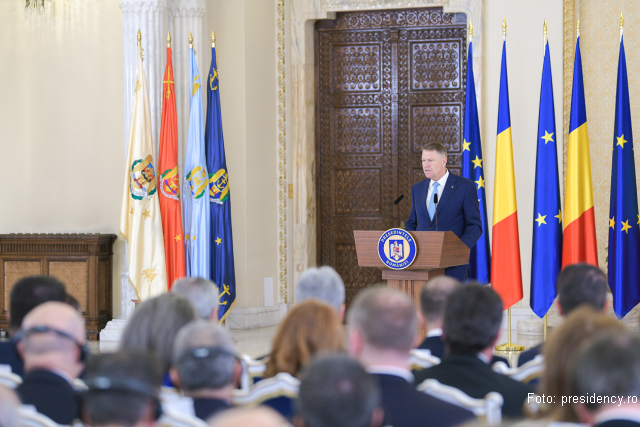Romania’s foreign policy in 2020
Romania aims to remain a stability factor and a firm promoter of democracy in the international community

Corina Cristea, 24.01.2020, 11:27
Romania aims to remain a stability factor and a firm promoter of democracy in the international community, President Klaus Iohannis said in Bucharest, at the annual meeting with the chiefs of diplomatic missions in Bucharest. The head of state presented the 3 main directions of the countrys foreign policy this year:
Klaus Iohannis: “Our EU and NATO membership, together with our strategic partnership with the USA, remain the core pillars of our foreign policy or, as I described them last year, the strategic conceptual triad of Romanias foreign policy. These pillars complement each other. At the same time, we will continue to work for Romanias Schengen accession, which will contribute significantly to strengthening security in the EUs visa-free area, and for joining the Euro zone, when all conditions have been met. In a short while Britain will exit the EU. It is something we havent wished for, but we will work to make sure that the friendship and alliance that have brought us together so far remain strong between Britain and the EU. We will also do our best to modernize the strategic partnership between Romania and Britain, something we are currently working on.
Romanias foreign policy will be defined, as it has been so far, by continuity and predictability, but naturally some nuances and emphases will shift, so as to provide more coherence and consistence, the head of state also said.
What are these nuances and emphases, and how can more coherence and consistence be ensured? Analyst Cristian Diaconescu, a former foreign minister, attempted a few answers for Radio Romania:
Cristian Diaconescu: “A country project overlapping a project for the entire region, and obviously in line with Romanias security and stability interests in one of the most complicated parts of the world, and on the other hand in line with the partnership relations, the standards and values that we all share as members of the EU and the North-Atlantic Alliance. This means more creativity in the area bordering the Black Sea and the Western Balkans, with a very complicated eastern neighbourhood and, more importantly, at the crossroads of the energy corridors—and implicitly the security corridors coming from Eastern Europe or from the Middle East.
In the current international context, facing risks, challenges and threats old and new, the need for a strong, united and efficient North-Atlantic Alliance is greater than ever, President Iohannis said:
Klaus Iohannis: “NATO is a successful military alliance and we will continue to work very closely with the other Allies to make it even stronger. This is the main message of the London anniversary summit of December 2019, and Romania will focus on this direction with renewed efforts, as an important ally on the eastern flank in NATO. We are determined to continue to fulfil our commitments to earmark 2% of the GDP to Defence, and we will continue to work to consolidate the Alliances determent and defence posture, particularly in the eastern flank. At the same time, in addition to the Allied effort at the Black Sea, Romania will support NATOs enhanced involvement in the Middle East and in fighting terrorism.
The President also mentioned the UN and the OSCE as platforms for consolidated dialogue and compliance with international law, and as commentators have noted, he used the word “multilateralism quite frequently.
Cristian Diaconescu: “First of all, because multilateralism is a key element in promoting and protecting Romanias interests. Secondly, because indeed, if we talk about the UN and OSCE, we can notice some political relaxation, a decrease in the role and the activity of these multilateral bodies, although they still remain relevant in many respects, which are important to Romania. And thirdly, because there is this tendency, especially among the great powers, to have separate dialogues and to make decisions irrespective of these international institutions, which raises concerns among countries, such as Romania, which are located in complicated regions and which end up receiving ready-made decisions in whose negotiation they have not taken part.
As regards the recent developments in the Middle East, the President of Romania said that the negative effects of this crisis impact the European and global security. Klaus Iohannis also said that Bucharest will resume full cooperation with the neighbouring Republic of Moldova when the Moldovan Government has proved its commitment to the countrys European accession, to reforms in the judiciary and public administration, and to fighting corruption.
(translated by: Ana-Maria Popescu)






























